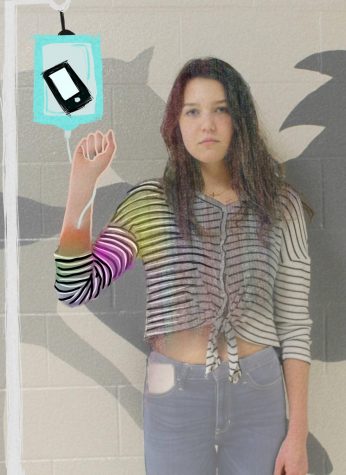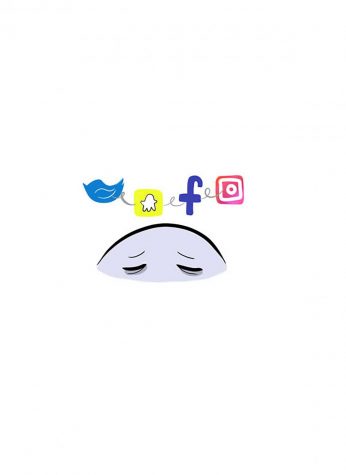The Sickening Effects of Technology
Students and professionals discuss how technology and social media has affected youth
According to the Office of Adolescent Health, every day, 94 percent of American teens will use the internet on their devices and 77 percent will go on some type of social media platform.
According to the Office of Adolescent Health, every day, 94 percent of American teens will use the internet on their devices and 77 percent will go on some type of social media platform. So, this prompts the question: is social media and technology use helping our generation or hurting them?
Senior Nathaniel Drasovean believes that technology has caused people to avoid social interaction. Overall, he is against the use of technology and said it is hurting people. According to Drasovean, one of the major downfalls of social media and technology is the lack of long conversations people have.
“It encourages a lot of short conversations,” Drasovean said. “[They are] really brief versus where, before, if you really wanted to talk to someone, it would be more of a time commitment; you would go set a long period aside to go and talk and really get to know them better. Whereas now, [there] are people just sharing short bits of irrelevant information, like what I ate, or what I got on my grades, and people aren’t really forming strong social bonds with each other.”
Drasovean notes that people, whether they notice or not, compare themselves to other people they see on social media and he blames this on the fact that human beings are just social creatures. He said that with social media, there is always going to be a fear of being outcasted or rejected from a social group when you are always seeing the best parts of other people’s lives. Social media is not giving the users and the world an accurate and realistic depiction of people’s lives. Technology and social media can halt in-person communication and being present in situations.
“I think a lot of people tend to avoid social interaction,” Drasovean said. “You see people all the time, on their tablets and they’re on their phones playing games or texting people instead of talking with whoever’s directly across from them.”
Senior Anish Kotnis agrees that social interaction has been hurt due to technology and social media use across Generation Z, which is comprised of individuals between the ages of three and 23. Kotnis also believes that social media oversteps boundaries and can be hazardous to teens.
“We don’t communicate with [our] friends at all,” Kotnis said. “Everyone is in your business and they can see what you are doing. It is an invasion of privacy and
dangerous.”
As for the future of social media and technology in society, Drasovean points out that there is a decline in Facebook among young users after the platform’s controversy surrounding privacy and users’ data rights. Due to this decline, he doesn’t know what the future will hold. Although many teens and other young people are leaving Facebook, Drasovean says they are moving to other social media platforms, which he points out are commonly Snapchat and Instagram. Drasovean admits it would be difficult to quit social media because of the fact that almost everyone is on it. There is a fear of isolation with quitting these platforms.
F.O.M.O., which stands for Fear Of Missing Out, is a common term used to describe that empty or upset feeling one has when they find out they weren’t invited to a function. Kotnis attributes these feelings to social tension. People do not know how to react to life without social media. Drasovean says the only way social media will stop is if large groups were to quit, because it is just too difficult for a single person to do it individually; the change would end up making the individual feel alone and cut off from the rest of the world. Some may fear missing out on events and others want to escape the social obligations they feel they have.
“People are always up in your business and they know what you’re doing and what you’re up to,” Kotnis said.
Now with Snap Map, Instagram stories and Find My Friend, it is easier than ever to find out what others are up to and where they are.
“Sometimes, I just ghost everyone for a little bit because I don’t really want to go on my phone,” Kotnis said. “I leave my phone somewhere and I don’t check it for hours or a day or so.”
Stepping away from social media and iPhones can be a good thing, according to Dr. Lauren Hazzouri, psychologist, speaker and founder of HeyLauren. She urges everyone to take a withdrawal from social media to focus on inner work.

“Social media isn’t going away anytime soon,” Hazzouri said. “So how you use your time during a social media detox to deal with the issues offline is key to ensuring you’re no longer triggered when you see a post online.”
Social media and smartphone usage have a direct correlation to one’s mental health, and the effects are not positive. According to studies done by the Child Mind Institute, individuals who use social media for hours a day increase their risk of depression by 27 percent. In fact, between 2012 and 2015, depression increased by 21 percent for boys and 50 percent for girls.
Junior Grace Neill uses an array of social media and admits to possibly using social media and her phone “too much.” She wants to start a YouTube channel to show the world her skills as an amateur photographer and express her love of makeup, which she has started to show on her Instagram profile. Neill believes that the good outweighs the bad in terms of technology use overall in Generation Z. One of her main positive effects of social media is communication.
“You can find really cool ways to use [social media]. For example, we can communicate across the world,” Neill said. “I think it makes relationships stronger. It can help if you have family members that live in another state. You can see what is going on in their lives when they post it on social media.”
Many students use social media as a way to express themselves but, Neill says, face-to-face communication has suffered as a result of such a rise in technology use among teens and adults. She says that people are so used to just texting that it can be difficult to speak to one another in person. According to Neill, people have become too attached to their phones when the first thing they do when out with their friends is take out their phone. Neill believes that being present in person is the best way to sustain a relationship, but when used properly, social media can be incredibly powerful and beneficial to staying in touch with loved ones.

While many people use social media platforms to show off their personality, Neill says she sometimes struggles to be herself on social media.
“I feel like I have to be like everyone else because you see people on Instagram that make you say, ‘Oh my gosh I wish I looked like that’ or, ‘I wish I had this,’” Neill said. “So, that can be kind of hard but when you realize how good we actually have it, being yourself is a lot easier than being someone you’re not.”
Psychologist Drew Yanke at Our People: Kids Empowered, believes that self-esteem plays a crucial role in deciding if social media is negative or positive. Yanke believes it is contingent on the individual. He says that Generation Z in general needs “instant gratification” and needs everything to be “liked” but being on social media isn’t being in touch with the real world. Life, in the grander scheme of things, doesn’t work as social media does.
Yanke said there is a problem with too much technology use. Children and adults alike can struggle to “balance” the real world and the world through their technology.
“I think kids aged two to 16 are now the generation that is deeply entwined into technology in an unhealthy way,” Yanke said. “There is now an inability to get bored, to not be entertained all the time.”
Yanke says that adults, especially, should keep technology away from other aspects of life.
“Adults are having a really hard time as well [as kids] with balancing technology and life,” Yanke said. “They should be separated.”
Yanke admits that technology has “connected” people but, unfortunately at the same time he believes that it has “pushed” people apart. For connect people, he agrees that it brings a wide span of people across the world together.
“Communicating via social media is efficient, but does not satisfy the need to be together with people and share actual physical space with others,” Yanke said.
Too much technology directly affects the prefrontal cortex which manages emotions, time management, social skills, etc. An excessive amount of phone and social media use over stimulates this region of the brain. In much simpler terms, as Yanke explains it, uncontrolled and unmanaged technology use can numb the brain.
In a recent study performed by researchers at UCLA, they investigated the way the brain works in teenagers when they are on social media. They placed 32 teens in a simulation to see how their brain would react when one of their pictures was “liked.” The researchers found that certain parts of the brain activated in the areas to show reward. It also discusses why adolescents are so addicted. The results point out some major differences between social media and in person communication and how is effects the two individuals. On social media you get instant likes even though you cannot see the person to see if they actually like whatever you posted. As for face-to-face communication, you can tell by body language and the way they respond if what you say or do is something they agree with. Social media removes the idea of disapproval. The downfall to this is it could make the brain physically change and grow in poor ways. The more time spent on social media the less likely an individual will be able to pick up on social cues.
Yanke has generally seen youth be affected by making them more anxious and stressed out. They are addicted and lack sleep. In addition to what Yanke has seen, a book that author and psychologist Jean M. Twenge wrote entitled “IGen.” In the book, she includes all of the characteristics that Yanke has noticed. Additional negative effects that she attributes to social media use include teens lack of urgency to learn or begin to drive and teens not going out with friends as often as previous generations. Overall, Twenge says that teens are also dating less, tend to be lonelier and the rate of teenage depression and suicide has skyrocketed since 2011. She would be right with that fact, according to the Department of Health and Human Services there are three million teens that have had some type of major episode of depression at least once and two million have severe depression that it halts their daily life. There is now a causal effect relating social media use to depression.
Neil believes it can be hard to be herself on social media and this isn’t an uncommon issue for individuals. Studies used in Twenge’s book were done over many decades show that 37% of teens and kids now feel like they “can’t do anything right” because there is pressure on them to be like what they see on social media.
“I think that the media puts a lot of pressure on us,” Neil said. “When you become too obsessed, it starts to form this idea that everything has to be perfect but, in reality, no one’s life is really perfect.”
When teens feel like their life isn’t as “perfect” as other people’s lives seem to be on social media, it can be the start of some depressive thoughts and symptoms. The more that people spend time on social media the more they become removed from the real world. They begin to see only happiest parts of social media, because that is all anyone posts about, and cannot decipher that what they are seeing isn’t the whole picture. They can no longer see that what is shown on social media is no one’s real life. That perfect picture social media page is not real. Perfection is unattainable.
In 2012, psychologist Sherry Turkle gave a Ted Talk discussing smartphone use. She pointed out the fact that smartphones “don’t only change what we do, they change who we are.” So why do people go to their phones rather than engaging in real-life communication? Turkle believes it is all because of the editing. You can delete what you don’t really mean or would rather not say but, human relationships aren’t perfect. Texting is just a “mere connection” as Turkle says. She says people turn to their phones because people are vulnerable beings and are afraid of intimacy, therefore, texting and using social media is a more comfortable method of communicating, and teens are not learning what it is like to communicate outside of social media.
But why is this? Why do teens struggle so much with removing themselves from the social media and smartphone world? Generation Z is the only generation that is growing up from adolescence with the use of smartphones, tablets etc. Previous generations received smartphones after their childhood, so they became accustomed to the world of smartphones in their adult years. From 2011 to 2012, an extreme rise in smartphone sales led to almost half of the population having a smartphone including nearly all of the middle class and upper-class populations. At this time, most current high school students were between the ages of eight and 12, leaving them with most of their childhood left. So, when kids are growing up with such devices and platforms of communication, children and teens are more likely to become addicted to their phones and inadvertently remove themselves from the rest of the world.
There are many generational changes between any two generations but, smartphones and social media usage have made some glaring differences between Generation Z and the generations that succeeded them. Yanke says contrasting two generations is only healthy but, this generation in comparison to the others has some major altercations.
“This generation differs so many ways that it would take pages to explain,” Yanke said. “In short, many think that this generation has lower empathy, resilience, time management, social skills, etc. These are just a few.”
An example of lower social skills in Generation Z is the lack of face-to-face communication. According to him, technology has allowed people to move rather quickly in revealing personal information.
“People are usually slower in person with information and opinion,” Yanke said. “People want to make a personal connection.” This ties back into what Drasovean believes about not getting the whole story when using social media and conversations being short and irrelevant.
So what does all of this mean for us? We have grown up with technology and its endless supply of information and social media where we can show ourselves to the entire world. It has become so entertaining and so much a part of us that we don’t know what life would be like without it. We cannot fathom a life without social media or our phones. Whether we would like to admit it or not, technology and social media are ruining our generation more than it is helping us. We are so addicted to our screens and that little “like” button at the bottom of our pictures, that our relationships and social skills are suffering because of it. It has come to the point where we become anxious if we do not have our phones near us. At what point will we learn that enough is enough? At what point will we figure out that the real world outside of our phones and social media is more important and beneficial? Social media and technology are defining our generation as less resilient and just plain stressed out. We want to change the world. We have to be in the world to do that. Enough is enough. Don’t let social media and technology ruin your life.
Your donation will support the student journalists of Troy High School - MI. Your contribution will allow us to print our work, purchase equipment and cover our annual website hosting costs.



